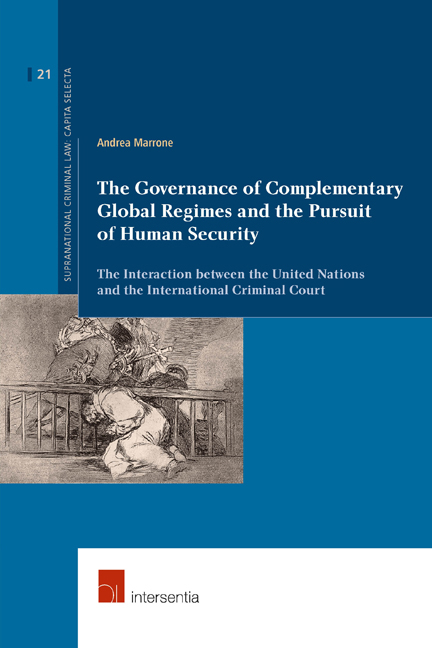 The Governance of Complementary Global Regimes and the Pursuit of Human Security
The Governance of Complementary Global Regimes and the Pursuit of Human Security Book contents
- Frontmatter
- Preface
- Study Outlook
- Contents
- List of Abbreviations
- INTRODUCTION
- PART I THE QUEST OF COMPLEMENTARITY AND THE DILEMMA OF HUMAN SECURITY
- PART II THE GOVERNANCE OF COMPLEMENTARY GLOBAL REGIMES: CHALLENGES, OBSTACLES AND CONCERNS
- PART III THE HUMANITARIAN ESCALATIONS OF LAST RESORT AND THEIR GOVERNANCE IN THE FIELD OPERATIONS
- 6 The International Responses to Mass Atrocities in Africa and the Criminal Regime in the Sudan
- 7 Multidimensional Operations and the Issue of Cooperation in the Democratic Republic of Congo (DRC)
- 8 Concluding Assessment. The governance architecture dealing with individuals in situations of war and crime
- Executive Summary
- APPENDICES
- Treaties, Legal Texts and Sources
- Bibliography
- About the Author
8 - Concluding Assessment. The governance architecture dealing with individuals in situations of war and crime
from PART III - THE HUMANITARIAN ESCALATIONS OF LAST RESORT AND THEIR GOVERNANCE IN THE FIELD OPERATIONS
Published online by Cambridge University Press: 15 December 2017
- Frontmatter
- Preface
- Study Outlook
- Contents
- List of Abbreviations
- INTRODUCTION
- PART I THE QUEST OF COMPLEMENTARITY AND THE DILEMMA OF HUMAN SECURITY
- PART II THE GOVERNANCE OF COMPLEMENTARY GLOBAL REGIMES: CHALLENGES, OBSTACLES AND CONCERNS
- PART III THE HUMANITARIAN ESCALATIONS OF LAST RESORT AND THEIR GOVERNANCE IN THE FIELD OPERATIONS
- 6 The International Responses to Mass Atrocities in Africa and the Criminal Regime in the Sudan
- 7 Multidimensional Operations and the Issue of Cooperation in the Democratic Republic of Congo (DRC)
- 8 Concluding Assessment. The governance architecture dealing with individuals in situations of war and crime
- Executive Summary
- APPENDICES
- Treaties, Legal Texts and Sources
- Bibliography
- About the Author
Summary
“If you want to understand the causes that existed in the past, look at the results as they are manifested in the present and if you want to understand what results will be manifested in the future, look at the causes that exist in the present.”
The Writings of Nichiren Daishonin, The Opening of the Eyes, 1272, Part I, p. 279PRELIMINARY REMARKS
The meaning of complementary global regimes fostering peace, justice and security depends on the ways they are governed in accordance with humanitarian principles. The international governance institutions deriving from such regimes have to meet the highest standards of accountability, effectiveness and quality management, including cooperation and support between them in order to protect civilians. The presence of the International Criminal Court and the United Nations involved in the same situations is not characterized by an integrated model of governance. The practice of saving human lives and alleviating the sufferings of civilians in conflict situations requires political convergence of expectations of decision-makers. This study debates the global humanitarian policy to intervene in conflict situations and the preparedness of international governance institutions dealing with mass atrocity crimes and aggression, including their public authority, delimitation of competence and responsibility. It contributes to the contemporary visions for the preservation of the international legal and political order, including the capacity-building of the international community governing intra- and inter-state conflicts on the ground, much more than as distant observers, or with militarized international responses deriving from the ideology of hazardous solutions. The dilemma of human security requires further policy efforts and a political road map to promote the extention of international complementarity between both legal and political frameworks of governance of the international community. The policy formulation of interaction strategies between multilateral premises of universal character dealing with international threats and crimes deserves debate for several reasons. Their complementary character depends on the political forces involved in the preservation of law and order and is considered absolutely necessary.
In this study the search of a definition of complementary global regimes is advocated a) for further progress of a universal jurisdiction of the world community; b) for the evolution of international governance institutions centralizing fundamental individual rights; and c) for systemic changes in the prevention, response and reconstruction of situations of war and crime.
- Type
- Chapter
- Information
- The Governance of Complementary Global Regimes and the Pursuit of Human SecurityThe Interaction between the United Nations and the International Criminal Court, pp. 323 - 354Publisher: IntersentiaPrint publication year: 2016
